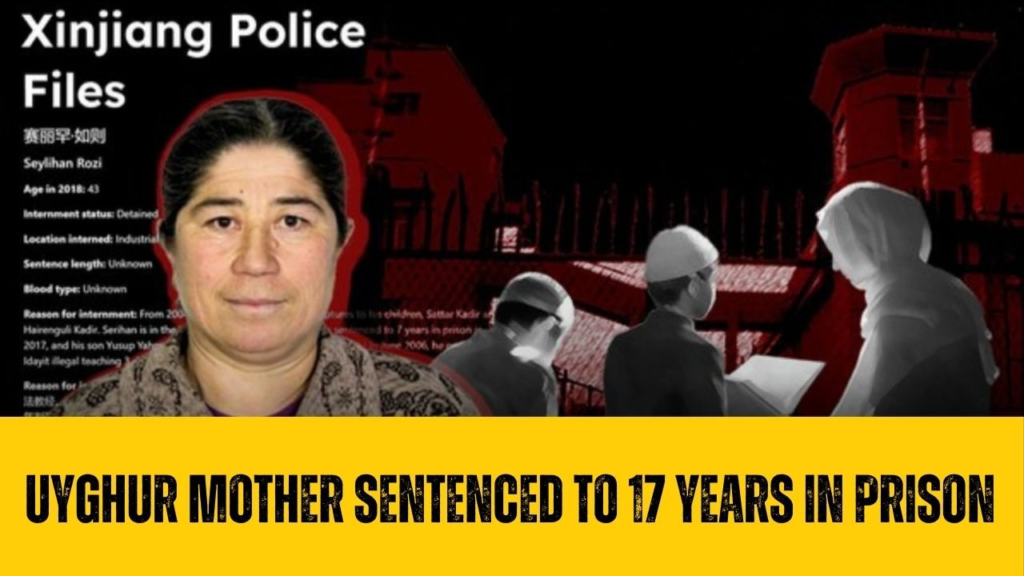The ongoing human rights crisis in China’s Xinjiang Uyghur Autonomous Region has drawn international attention once again. This time, the case of Seylihan Rozi, a 49-year-old Uyghur woman sentenced to 17 years in prison for teaching religious verses to her sons and a neighbor, has spotlighted the harsh realities faced by the Uyghur Muslim population under Beijing’s policies.
Rozi’s sentencing reflects broader trends in the region, where religious expression is increasingly targeted as part of China’s crackdown on Uyghur culture and identity.
The Case of Seylihan Rozi and Its Implications
Seylihan Rozi’s imprisonment occurred in Kashgar’s Konasheher county, where authorities classified her religious teaching as “illegal underground religious activities.”
This label, under China’s strict regulations on religion, effectively criminalizes the private practice or teaching of faith without state approval. Rozi’s sons were also sentenced to prison—one for 10 years and the other for 7—while a neighbor who attended the lessons, Yakup Hidayet, received a 9-year sentence.
The harsh penalties imposed on Rozi and others involved in the case exemplify the Chinese government’s broader campaign against religious expression in Xinjiang. Critics argue that this campaign is not about combating extremism, as the government claims, but rather about suppressing Uyghur cultural and religious identity.
Read : China Cancels Transgender Jin Xing’s Dance Shows in Foshan, Suzhou, and Shanghai
Draconian policies, such as banning private religious education, demolishing mosques, and detaining Uyghurs for practicing their faith, have become a hallmark of Beijing’s approach to the region. These actions are seen as part of an effort to assimilate the Uyghur population into the dominant Han Chinese culture while erasing their unique heritage.
The Uyghur Crisis: A Broader Context
The plight of Seylihan Rozi is far from an isolated incident. Uyghurs, a predominantly Muslim ethnic group with a population of approximately 12 million, are concentrated in Xinjiang, a region rich in natural resources and strategically significant for China’s Belt and Road Initiative.
Despite their historical ties to the region, Uyghurs now make up less than half of Xinjiang’s population due to state-driven migration of Han Chinese settlers.
Read : Shop Owner Jailed for Giving Salary Hike to Employees in Myanmar
Over the years, Xinjiang has become a focal point for allegations of human rights abuses, including mass detentions in so-called “re-education camps,” forced labor, surveillance, and cultural suppression.
Uyghur activists and international human rights organizations have accused China of carrying out a systematic campaign of cultural erasure, which some have labeled as genocide.

Beijing, however, defends its policies as measures to combat extremism, separatism, and terrorism in the region. The government has justified its actions by pointing to past incidents of violence and unrest in Xinjiang, but critics argue that the measures disproportionately target ordinary Uyghurs practicing their faith and preserving their culture.
Rozi’s case exemplifies how these policies are enforced at the grassroots level, criminalizing even the most private expressions of religious devotion.
Global Reactions and the Fight for Uyghur Rights
The international community has condemned China’s treatment of Uyghurs, with numerous governments, human rights organizations, and activists calling for action to address the crisis. Rozi’s imprisonment has further galvanized these calls, highlighting the urgent need for global advocacy to protect Uyghur rights.
The United Nations, the European Union, and the United States have all expressed concern over the situation in Xinjiang. Several countries have imposed sanctions on Chinese officials and entities linked to human rights abuses in the region.
Additionally, Uyghur activists have been at the forefront of efforts to raise awareness, urging the international community to hold China accountable for its actions.
In recent years, leaked Chinese government documents and testimonies from former detainees have provided chilling evidence of the scale and severity of the repression in Xinjiang. These reports detail the mass incarceration of Uyghurs, forced assimilation programs, and the destruction of cultural and religious sites.

The case of Seylihan Rozi serves as a stark reminder of the human cost of these policies. Her imprisonment, along with the sentencing of her sons and neighbor, underscores the need for sustained global attention to the Uyghur crisis.
The sentencing of Seylihan Rozi to 17 years in prison for teaching religious verses to her sons highlights the ongoing suppression of Uyghur culture and religion in Xinjiang. While the Chinese government frames its actions as efforts to combat extremism, the reality on the ground suggests a systematic campaign to erase Uyghur identity.
As Rozi’s story gains international attention, it serves as a rallying cry for those advocating for human rights and religious freedom. The global community must continue to press for accountability and ensure that the voices of Uyghurs are not silenced.
The plight of the Uyghur people, exemplified by cases like Rozi’s, demands not only condemnation but also concrete action to protect their fundamental rights. Only through collective efforts can the world hope to address the injustices faced by the Uyghurs and pave the way for a future where their culture and identity are preserved.

